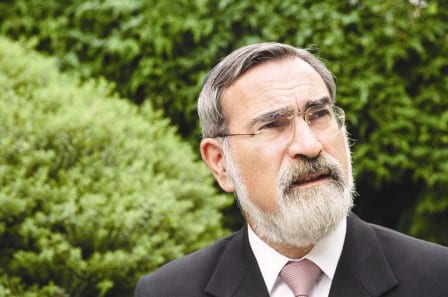The Chief Rabbi’s Message- Rosh Hashanah 5776

At the height of our High Holyday services we will declare: “Penitence, Prayer and Charity can avert the evil decree”. We will recognise that prayer is a central, fundamental and transformative ingredient of our Jewish experience. According to the Talmud, prayer is “worship of the heart” and one of the pillars upon which the world stands.
During the past year I have enjoyed wonderful prayer services in numerous communities across Great Britain and the Commonwealth. In recent months I have begun engaging with our Rabbis and other community leaders to explore ways in which we can stimulate added enthusiasm for tefilla, including, for example, seeking to encourage Batmitzvah and Barmitzvah celebrants to have greater knowledge of and proficiency in our tefillot.
The Hebrew term tefilla, is, however, significantly different from the English “prayer”, which is derived from the Latin precari, meaning to beg or entreat. The root of tefilla is the Hebrew word “pileil,” meaning to judge. It is found in the Torah in situations in which action has been taken or an intervention has been made. For example, in recounting the famous Biblical story of Pinchas’ intervention when he encountered a couple engaging in an adulterous relationship, the Book of Psalms states ‘Vaya’amod Pinchas Vayefalel’ – “Pinchas stood up and intervened”.
From here we learn that tefilla is far more than words spoken in supplication to or in praise of God. The reflexive “lehitpaleil,” means to judge or to analyse oneself. Through self-evaluation we engage in a constructive and healthy activity that can re-fashion our lives. Tefilla affords us the opportunity to take a long, hard and honest look at ourselves in the Divine shadow of God’s presence, where nothing can be denied or hidden; to differentiate between what we want and what we need; and to give voice to our deepest hopes and aspirations, resolving to work passionately to achieve them.
Sometimes, those for whom tefilla is second nature can pray as a matter of routine and can struggle to find genuine meaning in what they are saying. Conversely, those with less grasp of the liturgy sometimes find that a catchy melody or special atmosphere provides them with great inspiration. It is revealing that as we finish the ‘Amidah’ we say, “Let the words of my mouth and the meditation of my heart be acceptable before You.” Neither the words nor the sentiment alone are sufficient – both are required together to be truly impactful. This is something that every one of us can achieve.
5775 has been a challenging year for Jewish communities at home and abroad. Murderous attacks on Jewish communities in Europe have left many feeling vulnerable and concerned. None of us can change the world overnight, but we can change ourselves, which, in turn, does indeed transform the world we live in. Tefilla provides us with the key to unlocking that potential if we can approach it with the requisite humility and vigour.
May we all merit to discover the great beauty and value of tefilla, so that we begin 5776 with renewed positivity and sense of determination. Valerie and I extend to you all our very best wishes for a happy, healthy, peaceful and fulfilling New Year. Shana tova.
Chief Rabbi Ephraim Mirvis
September 2015 • Ellul 5775







